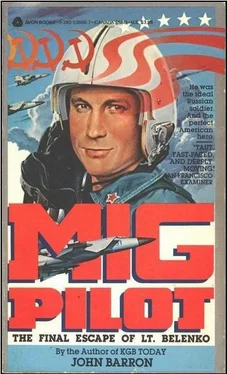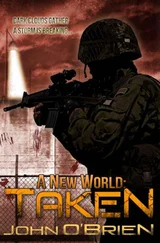The grandmother and aunt lived in one of some forty mud and straw huts that constituted a village near Mine No. 24. Coal dust darkened every structure of the village and so permeated the atmosphere that after a storm temporarily purified the air, food tasted strange. The women occupied one room of the hut and built a bed for Viktor in the other, where they cooked and ate. His aunt rose daily at 5:00 A.M. to draw water from the communal well, stoke the fire, and prepare soup and bread for breakfast before she walked to the mine. There she worked from 7:30 A.M. to 6:00 P.M., sorting debris and alien particles from coal passing on a conveyor belt. She had no gloves, and often her hands were bruised or bleeding. His grandmother, in her seventies, hobbled about with a stick during the day, acting as a good Samaritan, visiting the sick and elderly and attending to an invalid widow who received no pension. Each evening she chanted long litanies before an icon in the corner.
Winter confined Viktor to the hut because, until he was six, he had no shoes. From the sleeves of an old jacket his aunt sewed slippers useful for dashes to the outhouse but unsuitable for prolonged wear in snow. Incarcerated alone, he could amuse himself only by the exercise of his own imagination and curiosity.
A few days after his fourth birthday Viktor sat close by the stove, a source of both warmth and mystery. What made it yield such good warmth? To find out, he slid open one of the portals, and a burning coal tumbled out onto the straw covering the clay floor. As the hut filled with smoke, he sought escape by crawling into his grandmother’s bed and burying himself under blankets. Smoke still billowed from the hut when he regained consciousness outside, lying in the snow and coughing under the watch of the neighbors who had rescued him. That evening, after they had scrubbed and straightened the hut, his grandmother said, “Viktor, God is watching over you.”
During warm weather Viktor wandered and explored, unrestrained, with older boys. A favorite playground was a forbidden area in the woods off the main road between the village and the mines. Here retreating German troops had made a determined stand, and although some nine years had passed, the battlefield had not been entirely cleared. Among trenches and revetments there could still be found live rifle and machine-gun bullets, which the boys used to make firecrackers to scare “witches" — that is, women who scolded them — and small “bombs” for killing and surfacing fish in the river.
Digging for bullets, they unearthed a large, flat, cylindrical object that seemed to them an authentic treasure — one that could be smelted down for thousands of slingshot pellets. Building a bonfire, they gathered around to begin the smelting. The fire waned, and Viktor, being the youngest, was ordered to gather more wood. As he returned, the land mine exploded, hurling him against a tree and causing a severe concussion. Hours later he awakened in the arms of his grandmother, who said with conviction, “You see, Viktor, it is as I said. God is watching over you.” The blast had killed two of his friends and badly crippled a third.
That same spring Viktor heard commotion and what sounded like wailing outside the hut. People were gathering in the street, mostly women but some older men also, commiserating with one another, weeping and sobbing, a few hysterically. “Our savior and protector is gone!” a woman moaned. “Who will provide for us now?” The news of the death of Joseph Stalin had just reached the village. Always portrayed by every Soviet medium as a kind of deity, Stalin was so perceived in the village — the military genius who had won the war, the economic genius who had industrialized a feudal society, the political genius who had liberated the Soviet people from capitalist slavery, the just and benign patriarch who had secured the welfare of all.
Accidents frequently took lives in the mines, so Viktor was familiar with mourning and funerals. He had always seen the villagers confront death with stoic restraint, and their bravery added to his regard of the miners as heroic men who risked their lives for the Mother Country. But never had he experienced such unrestrained outpouring of grief and despair as now. It alarmed him and made him wonder, too, how life would proceed without the noble Stalin.
A letter in the autumn saddened both his aunt and his grandmother. His father was coming to take him to Siberia. The grandmother sewed a kind of knapsack for him, and they packed it with food, including some smoked meat, to which they never treated themselves. Through a thick December snowfall the women walked with him and his father to the rail station and held each other, then waved as the train pulled away. He never saw either again.
Authorities in the Siberian city of Rubtsovsk had assured his father that the room in the communal apartment for which he had waited forty-two months would be available by December. It was not, and Viktor was sent to stay on a collective farm, or kolkhoz, to the south with relatives of his father’s friend, the factory manager. The family — father, mother, and four children — were crowded into one room, and his first evening Viktor stared in wide-eyed wonderment as a cow was led into the hut for the night so she would not freeze to death.
Despite the scarcity of space, the family welcomed him as one of their own and, as had his aunt and grandmother, shared with him unstintingly. He soon recognized, however, that the kolkhozniks were far poorer than the miners of the Donbas. The collective allocated each family grain for bread on the basis of the number of workdays credited to the household, rather than according to the number of members. The ration for families with very young children or elderly relatives unable to work was thus short. The small salary paid the kolkhozniks barely enabled them to buy essential salt, soap, and kerosene. For purchase of shoes, clothing, and other necessities, they depended on proceeds from the sale of milk and produce grown on their tiny private plots, which they tended fervently and carefully. Throughout the winter their diet consisted of bread and milk for breakfast, boiled potatoes, sauerkraut, and bread for dinner and bread and milk for supper. After the cow stopped giving milk, they drank water.
The winter of 1954 was especially severe in Siberia, so cold that frozen birds littered the ground, and in February the cow could not be allowed outside very long even in daytime. The children amused themselves around the wood-burning stove with games of their own design, and Viktor devised the most popular. The hut was inhabited by big reddish-brown cockroaches, which were accepted as legal residents of all peasant homes and hence not necessarily considered repellent. The intricacy of their bodily composition and functioning fascinated Viktor, and he studied them long and curiously. How did such complicates creatures come to be? Why are they here? What gives them life? Watching how quickly they skittered about, he conceived the idea of harnessing the cockroaches by attaching threads between them and toy carts carved from wood. After many failed attempts and mangled insects, he succeeded and began to stage races. The competition became such a source of mirth for all that sometimes after supper the father would say, “Well, Viktor, let us have a race.”
The spring thaws awakened and changed the kolkhoz. The pure air turned pungent with the omnipresent stench of ordure, but radishes, cucumbers, and tomatoes appeared in the garden, and they tasted delicious. Viktor worked in the fields eleven to twelve hours a day alongside other children, women, and older men, in their fifties or sixties, who constituted most of the labor force. The few teenagers among them malingered and caviled, cursing their barren life in general and the paucity of meat in particular. Once Viktor heard an old woman snap at them: “During the war, we were glad to eat grass and acorns and mice and grasshoppers. You should be grateful that things are much better now.” It never occurred to him that the toil was onerous. He liked the outdoors, the physical exertion, and the discoveries of how soil, moisture, sun, and time transform seed into wheat. For a boy of seven it was a pleasant summer.
Читать дальше












